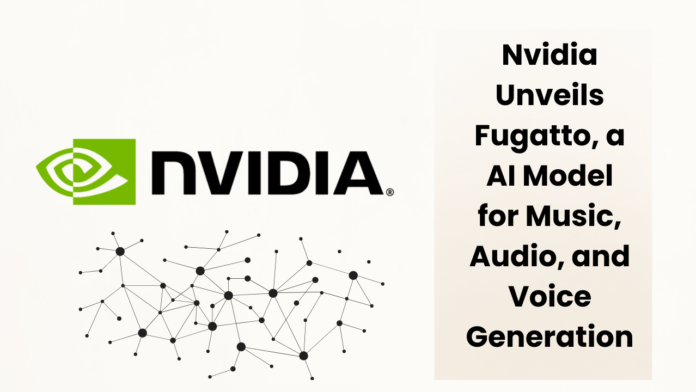Nvidia, the world’s leading supplier of chips and software for AI systems, unveiled an innovative artificial intelligence model on Monday that is set to transform the music, film, and video game industries. The new AI, named Fugatto—short for Foundational Generative Audio Transformer Opus 1—is designed to generate music, modify voices, and create entirely novel soundscapes.
Fugatto promises to revolutionize how audio and music are produced, offering powerful new tools for creative professionals, from music producers to film sound designers and video game developers. Using cutting-edge deep learning techniques, the model can compose original pieces of music, alter the tone and style of voices, and even craft unique sound effects that were previously unattainable with traditional methods.
“Fugatto is more than just a tool; it’s a game-changer for creative industries,” said Jensen Huang, CEO of Nvidia. “The model’s capabilities offer limitless possibilities for musicians, filmmakers, and game developers, enabling them to push the boundaries of sound and storytelling in ways we haven’t seen before.”
Nvidia’s announcement comes at a time when AI-generated content is gaining rapid traction, with companies like OpenAI and Google pushing the boundaries of AI’s role in creative fields. Fugatto, however, distinguishes itself by being specifically designed to focus on high-quality audio generation with a particular emphasis on seamless voice modulation and sound generation—two key aspects that have traditionally been difficult to automate.
Although the technology shows great promise, Nvidia has stated that it has no immediate plans to release Fugatto to the public. Instead, the company intends to work with select industry partners, particularly in the music, film, and video game sectors, to refine and enhance the model. Nvidia’s goal is to ensure that the model’s capabilities are tailored to the specific needs of these industries before making it widely accessible.
In an exclusive demonstration at the company’s headquarters, Nvidia showcased Fugatto’s ability to generate a full orchestral composition based on a brief text prompt. The model could also modify the pitch, tone, and cadence of voice samples to match a particular emotional tone or character, as well as create entirely new sound effects for cinematic experiences. “The potential to synthesize a range of sounds with this kind of precision is a leap forward in what we can do with audio design,” said David Yoon, a sound engineer who worked on the demonstration.
Despite its potential, Nvidia made it clear that it is taking a cautious approach to Fugatto’s release. “The focus is on ensuring this technology is used responsibly and ethically,” said Huang. “We’re taking steps to make sure the tools we create don’t have unintended consequences, particularly in areas such as deepfake audio generation.”
While Fugatto’s future availability remains uncertain, the industry is buzzing with excitement about the possibilities the model presents. Music producers, filmmakers, and game developers are already speculating about how they might incorporate the technology into their own creative workflows, with some predicting that it could soon become a cornerstone of digital production tools.
For now, Fugatto exists as a glimpse into the future of AI-driven creativity—one where the boundaries between human imagination and machine-generated sound blur even further. Whether it’s composing a symphony, crafting the perfect voiceover, or inventing new auditory landscapes, Nvidia’s Fugatto is set to be a game-changer for the entertainment and creative industries.




